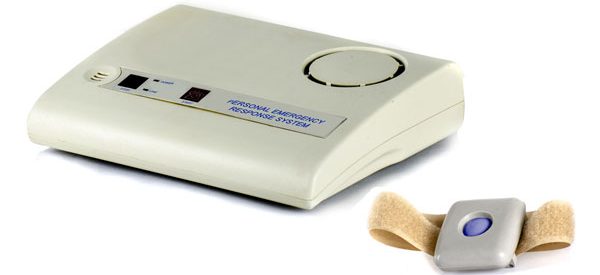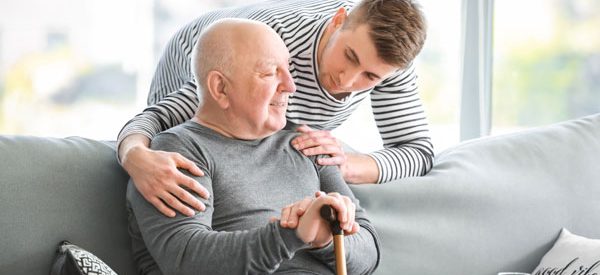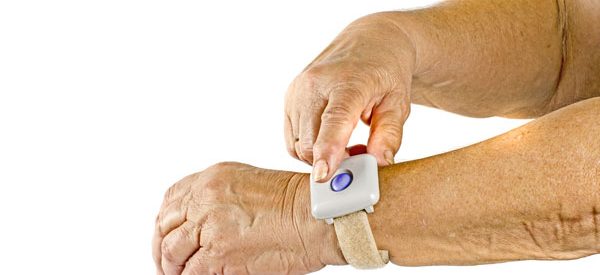
Guide to Medical Alert Systems for seniors in Winnipeg

Medical alert systems are personal emergency response devices that connect users to emergency support services with just one press of a button.
Now you don’t have to fumble with a keypad when you are experiencing a personal or medical emergency! Just press the panic button on the pendant or wristband you are wearing and you instantly get connected to an emergency operator.
Responders who take emergency calls are trained to handle discreetly and efficiently all kinds of emergencies. They can call for an ambulance, the police, or notify a family member. No emergency is too small or minor and they are available 24/7.
Have you been worried lately about being alone in an emergency? Stop wondering what to do and get a reliable medical alert system for your safety. If you have an elderly parent or relative, a medical alert system is the best way to reduce your anxiety about their well-being.
Discover the best medical alert systems in Manitoba using our short online form to get FREE and NO COMMITMENT quotes.
Who needs a medical alert system?

Aging in place is something many seniors want to do because they are happier staying at home than anywhere else.
However, it isn’t easy for some seniors to be independent because they are prone to accidents, falls, and other emergencies. Getting help fast in an emergency can be an issue for seniors who are home alone or if loved ones are far away.
Fortunately, technology has made it easier for seniors today to continue to live independently without fear, thanks to medical alert systems.
Who needs a medical alert system in Winnipeg?
Caregivers, medical professionals, and senior organizations recommend the use of medical alert systems as part of an overall senior care plan.
They are recommended for any of the following:
• Seniors living alone or far from their loved ones;
• Older adults or seniors with medical conditions;
• Adults or seniors recovering from surgery, an illness, a disability, etc. who may experience a personal or medical emergency;
• Seniors with dementia, Alzheimer’s, or other similar conditions
• Seniors with a history or fear of falling
Whether you need to contact a family member, neighbor, Emergency Medical Services, or the police, your medical alert system will make sure to get you HELP really fast.
Medical Alert System or Smartphone for seniors?

Which should you have if you experience an emergency, a medical alert system for seniors or a smartphone?
Unfortunately, it isn’t possible to use a smartphone everywhere. The device needs to be within range and must be adequately charged. It is also not possible to carry a smartphone while you are in the bath.
Cellphones also need two hands to operate it, making it difficult when a senior is injured, unconscious, panicky, or feeling weak.
On the other hand, medical alert systems are always within reach because you wear the device all time- to bed, when you shower, while doing errands, or resting. Since emergencies happen without a warning, wearing your personal help button makes sure you can reach someone quickly with one press of the button.
When a senior user presses the panic button, he is instantly connected and can speak via voice communication system to a trained responder. He will keep the senior calm while dispatching help without delay.
A sympathetic and calm voice on the other end will do much to allay the fears of a senior and reassure that help is coming.
A smartphone won’t help you if you have fallen.
Don’t put yourself at risk by relying on a smartphone in an emergency! Seniors can be better protected by a medical alert system with professional monitoring.
What can a medical alert system do for seniors?

Medical alert systems or personal emergency response systems enhance other services such as private nursing, hands-on care, or family support to help seniors stay comfortable and well.
Technology plays a significant role nowadays when it comes to caregiving.
Studies show that 1 in 3 older Canadians fall every year, making it one of the most common reasons for visits to the emergency room. The Public Health Agency of Canada states that “ 1/3 of seniors hospitalized due to a fall end up in long-term care.”
Being alone in a medical emergency such as a fall is a cause of anxiety. Many medical alert systems offer automatic fall detection which is reassuring to seniors and to their loved ones as well.
Medical alert systems can protect seniors with:
• 24/7 guaranteed access to emergency services with a personal panic button
• Instant live chat with an emergency operator during an emergency
• Automatic fall detection
• GPS tracking to protect against wandering
• Geofencing
• Medication reminders
• Caregiver platforms for health management
Personal Help Button with Instant Voice Chat
A medical alert system comes with a wearable pendant or bracelet with a personal help button. Press it to call for help and you instantly get connected with an emergency response technician. After verifying the nature of the emergency, he will contact medical responders or a family member, as needed.
If you press the panic button and the emergency technician cannot contact you, he will notify a family member or if deemed necessary, dispatch emergency services.
The operator remains with you on the line until help arrives so you are never really alone.
Automatic Fall Detection
Standard medical alert systems require users to push the help button after a fall. More advanced systems with auto fall detection can detect falls and alert a monitoring center. If the user fails to push the button after a fall, a fall alert is received and the monitoring center will try to reach the user. If they cannot contact the user, they notify a family member or send emergency services to the home to assist.
Getting medical attention after a fall is critical for seniors. Why? Studies shown that 60% of seniors who don’t get medical assistance within the first hour may find it hard, if not impossible, to return to independent living. When a senior is left lying on the floor for a long time after a fall, they can develop complications that have serious implications to their health.
Automatic fall detection can be included in a medical alert system for an additional price. Although the technology is not 100% accurate, the reliability is high. These advanced systems use sensors to differentiate falls from normal movements such as sitting down, bending, or lying down.
Fall detectors are additional layers of protection for seniors, particularly those who have already experienced a fall in the past.
GPS tracking technology
GPS tracking technology in medical alert systems is similar to what is used for car GPS. Wireless or cellular medical alert systems include this feature for protection of seniors who are at risk for wandering. This feature is particularly useful in emergency situations when the user cannot provide his exact location so that emergency services can arrive faster.
In Canada, seniors who are missing or lost get reported daily to the police and if they are not found quickly, they can suffer serious injuries or health complications. Thus, medical alert systems with GPS tracking can protect seniors with dementia, Alzheimer’s, or other similar conditions.
Geofencing
Seniors with dementia are prone to wander as the disease progresses. They get confused even when in a familiar place. And while they are encouraged to move as freely as possible, a balance between safety and independence is crucial.
Locating devices using transmitters installed in pendants, cellphones, or wristbands can increase a senior’s safety and the peace of mind of his loved ones. Unlike a cellphone, the user does not need to operate the device for the technology to work as long as he is wearing the device.
With geofencing technology, the system sends out an alert when a senior or user crosses a predetermined “safe” zone. With medical alert systems, an alert is received by a monitoring center who notifies designated contacts of the situation.
Geofencing is an additional feature offered by cellular medical alert systems. While it makes a medical alert system more expensive, the extra protection you get is worth it.
Medication reminder
Medications for arthritis, tremors, diabetes, dementia, and other similar conditions is a serious problem for many adults and seniors. Following a medication regimen with multiple dosages and schedules can be overwhelming. A pill box may not be enough to help a senior manage his medications.
The problem is compounded for seniors living alone.
The good news is that medical alert systems offer medication reminders and dispensers that can significantly reduce this burden.
As a result, medication compliance for seniors with medical alert systems has increased, providing great relief to seniors and their caregivers.
They are simple, easy-to-use, and very affordable. Together with the other benefits of a medical alert system, seniors can enjoy more independence while ensuring their well-being.
Choosing a medical alert system for your loved one

A medical alert system is one of the best ways that we can ensure the safety and well-being of an aging parent or relative.
But because there are many options in the market, researching medical alert systems can be confusing when you don’t know where and how to start.
We recommend that you begin by considering the following factors:
1. What do you need a medical alert system to do for you?
The many devices in the market have different features. The standard ones provide access to emergency services via a panic button. More advanced systems offer additional features for a higher cost including GPS tracking, auto fall detection, medication reminders, and geofencing. When choosing a medical alert system, it is essential to get a system that provides the service that you need. For a parent with Alzheimer’s, you may want to include geofencing and GPS tracking.
2. What type of system and equipment will work best?
You have a choice between landline systems or cellular systems. Landline systems are the cheapest and simplest to use. Keep in mind, however, that they work within a specific range. Make sure to get a system with a range that covers your entire home. Medical alert companies offer coverage of 300, 600, 1000 ft. or more. Wireless systems work virtually from anywhere there is cellular signal. If you don’t have a landline or need to use a medical alert system outside the home, you may want to go for a wireless system.
3. Who monitors alerts from the device?
When you start comparing medical alert systems, you will discover that there are monitored and non-monitored systems. Non-monitored systems have no monthly fees but they are monitored by a designated contact/s such as a family member or 911.
Non-monitored systems are cheap but they don’t provide 100% assurance like monitored systems. Your designated contact may be unavailable during an emergency and the response to your call for help may be delayed. These systems are also pretty standard and don’t provide additional features offered by monitored systems.
Monitored systems, on the other hand, have monthly fees. They guarantee FAST response to a call for help because they operate 24/7.
4. What is the cost of the medical alert system?
Medical alert system companies offer different price models for their products and services. Some provide the system under a lease arrangement and you pay monthly monitoring fees. Other companies require the outright purchase of the device plus monthly monitoring fees. You will also need to check the length of the contract and the terms for cancellation of the service.
You may also want to find a system that has activity monitoring and provides reports on activity and health status. Some medical alert systems provide a caregiver platform where you can access and manage a loved one’s health information.
To start your search for the right medical alert system for a loved one, fill out the form on this page to receive the BEST OFFERS from our reliable medical alert partners, free of charge.
Checking up on a medical alert company
When you are in the market to buy a medical alert system, you will likely be impressed by the sheer variety of products and systems in the market. They will all claim to be wonderful and you won’t be in any shortage of options.
Bear in mind that these medical alert systems are not all equal. Some may be really worthless while others lead the pack. As you are getting a device for your protection or that of a loved one, it is of utmost importance that you make the right choice.
Most health experts will agree on one thing – it is not just the device that is important but the COMPANY as well. Many of them offer the same options – landline, cellular, waterproof pendant or bracelet, and GPS with auto fall detection. Most of them also use the same equipment they buy from manufacturers and work with the same monitoring centers.
Hence, if they use most of the same equipment and monitoring centers, what really separates one medical alert company from another? You need to look into the company – their pricing, terms, contract requirements, and customer service.
It is important that you deal with a reputable medical alert company and not a bad one you will get stuck with for years.
Separate the good from the bad ones by asking:
• How long is your monitoring contract?
• What do I pay if I need to cancel the service?
• What are the terms for cancelling the service?
• What happens if my equipment stops working?
• Is the monthly monitoring fee guaranteed for the duration of the contract?
Seniors are vulnerable and deserve the best treatment and care possible from a medical alert company.
Top Medical Alert Systems in Winnipeg to consider

We know you want to get the best medical alert system for the right price!
Below you will find some of the top medical alert systems in Winnipeg to consider for you or a loved one. Compare features and prices to save time and money.
These medical alert companies offer in-home systems or wireless systems for more active seniors.
Victoria Lifeline Medical Alert System
As part of the Victoria General Hospital Foundation, this medical alert system in Manitoba is integrated into the healthcare system and has been trusted for over 30 years.
It began as a non-profit program created by the hospital in 1985 to enhance the health of the South Winnipeg community. With the goal of helping seniors to remain independent in their homes for as long as possible, the Victoria Lifeline Medical Alert service was established I 1988. Its first monitoring center was located in the Emergency Department of the hospital.
Years later, the company has partnered with Philips Lifeline to offer state-of-the-art fall detection systems with Auto Alert. Emergency calls are responded to by trained Lifeline Personal Response Associates from Philip’s Lifeline Response Centres.
Customers can choose from:
• HomeSafe Standard
• HomeSafe with Auto Alert
• GoSafe (Cellular)
Professional installation is available for all types of service plans and has no upfront fees or long-term contracts.
The prices of their service plans are only available when you call their hotlines.
Life Assure Medical Alert Systems
Life Assure Medical Alert Systems allow seniors to get the help they need with a personal panic button.
Available across Winnipeg and its surrounding areas, this medical alert system is convenient and affordable for seniors because they don’t require a contract and offers a risk-free program. You can cancel the service for any reason without a penalty.
Prices of Life Assure Medical Alert Systems:
| Type of Service Plan | Description | Equipment Cost and Monitoring Fees |
| Life Assure Classic Home | VoIP and cable ready, works with any phone line with water-resistant pendant or wristband detection range of up to 600 feet with fall detection option | $29.95 monthly |
| Life Assure Total Home | uses cellular technology water-resistant pendant or wristband detection range of up to 600 feet with fall detection option | $44.95 monthly |
| Life Assure Premium Mobile Plus | can be used anywhere with cellular signal with fall detection and GPS tracking | $69.95 monthly |
Galaxy Medical Alert Systems
Galaxy medical alert systems company has more than 25 years of expertise in the alarm and security fields. Today, it offers a top medical alert system for seniors from all over North America.
All systems come with waterproof wearable personal help buttons. It can also cover both spouses or parents by paying for a second button.
Their response center is CSAA-5 Star rated which means the operators are well-trained in emergency assessment and handling.
With headquarters in Windsor, Ontario, their products and services are also available in Winnipeg.
Prices of Life Assure Medical Alert Systems:
| Type of Service Plan | Description | Equipment Cost and Monitoring Fees |
| Cellular system | uses 3G/4G technology | $44.95 monthly |
| Fall detection system | Immediately detects a fall and sends a fall alert | $39.95 monthly |
| Home and Away with GPS | Wireless system with 24/7 access to emergency services from anywhere in Canada | $44.95 monthly |
| Home and Yard System | With access to emergency support from the home or out in the yard (up to 500 feet) | $34.95 monthly |
| Home system | with access to emergency support from inside the home | $29.95 monthly |
| Mobile with Fall Detection | Works from virtually anywhere in the country with auto fall detection capabilities | $49.95 monthly |
Global Security Numera Libris
The Numera Libris medical alert system offered by Global Security is a high-tech fall detection system and personal emergency response system. It is backed by the company’s solid experience in the security industry. As a leading provider of ADT security systems in Canada, the company has an excellent track record for security monitoring.
Aside from its advanced fall detection technology, their systems also come with GPS tracking and access to a powerful caregiver platform called EverThere.
The company requires a 36-month monitoring contract. A secondary user like a spouse or parent can be covered by purchasing a second button.
Cost of the Numera Libris from Global Security:
| Type of Service Plan | Description | Equipment Cost and Monitoring Fees |
| Basic Package | with water-resistant pendant or wristband 2-way voice system | $34.99 monthly |
| GSM Package | fall detection option GPS tracking access to EverThere platform with activity monitoring enhanced safety with bed sensors | $379.99 for the equipment $99 activation fee $79 for the panic button |
Alarm Guard Security Senior Protection
Alarm Guard Security offers total protection for the elderly with built-in fall detection and GPS tracking technologies.
Their panic pendants come with 4G cellular technology that allows Canadian seniors to be protected while traveling across the country.
Trained operators assist in an emergency when the user presses the panic button or when a fall is detected.
Designated caregivers or family members can also receive alerts and notifications and access GPS location.
Their systems don’t require a landline connection with waterproof help buttons that can be used in the bath or shower.
This personal emergency response system is recommended for adults 55 years old and above.
There are no published rates available for this medical alert system.
These are but some of the medical alert system available in Winnipeg. You can compare multiple systems and plans by filling out the form below to get the right medical alert system for you!
Comments are closed.

Copyright© 2024 Compare Home Quotes.
Oolong Media






